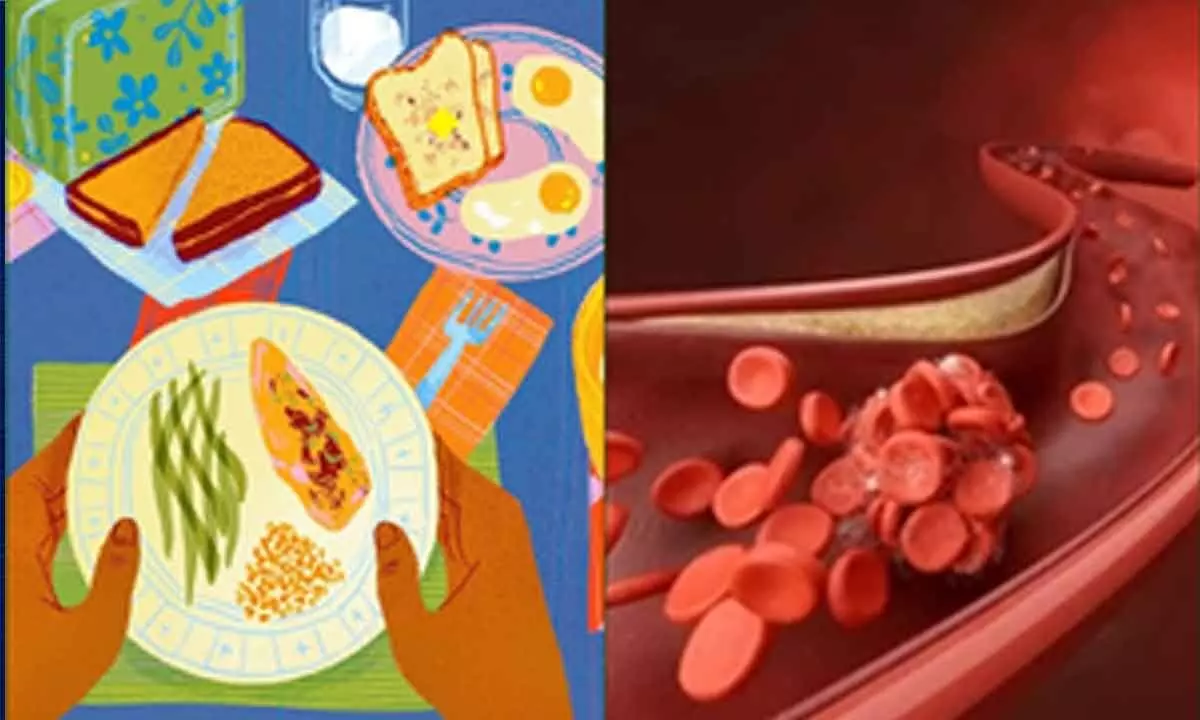Consuming over 22 per cent protein daily may clog your arteries: Study
Share :

While eating protein is essential for good health, US researchers have discovered a molecular mechanism by which excessive dietary protein could increase atherosclerosis risk.
While eating protein is essential for good health, US researchers have discovered a molecular mechanism by which excessive dietary protein could increase atherosclerosis risk.
Atherosclerosis is the build-up of fats, cholesterol and other substances in and on the artery walls.
The study, which combined small human trials with experiments in mice and cells in a Petri dish, showed that consuming over 22 per cent of dietary calories from protein can lead to increased activation of immune cells that play a role in atherosclerotic plaque formation, driving the disease risk.
Furthermore, the scientists showed that one amino acid -- leucine -- seems to have a disproportionate role in driving the pathological pathways linked to atherosclerosis, or stiff, hardened arteries.
"Our study shows that dialing up your protein intake in pursuit of better metabolic health is not a panacea. You could be doing real damage to your arteries," said Babak Razani, Professor of cardiology at University of Pittsburgh School of Medicine.
"Our hope is that this research starts a conversation about ways of modifying diets in a precise manner that can influence body function at a molecular level and dampen disease risks," Razani added.
The findings are published in the journal Nature Metabolism.
Previous studies have also shown that overreliance on protein may not be such a good thing for long-term health.
Following their 2020 research, in which Razani's laboratory first showed that excess dietary protein increases atherosclerosis risk in mice, his next study in collaboration with Bettina Mittendorfer, a metabolism expert at the University of Missouri, Columbia, delved deeper into the potential mechanism and its relevance to the human body.
"We have shown in our mechanistic studies that amino acids, which are really the building blocks of the protein, can trigger disease through specific signaling mechanisms and then also alter the metabolism of these cells," Mittendorfer said.
"For instance, small immune cells in the vasculature called macrophages can trigger the development of atherosclerosis."
Based on initial experiments in healthy human subjects to determine the timeline of immune cell activation following ingestion of protein-enriched meals, the researchers simulated similar conditions in mice and in human macrophages, immune cells that are shown to be particularly sensitive to amino acids derived from protein.
Their work showed that consuming more than 22 per cent of daily dietary calories through protein can negatively affect macrophages that are responsible for clearing out cellular debris, leading to the accumulation of a "graveyard" of those cells inside the vessel walls and worsening of atherosclerotic plaques overtime.
Interestingly, the analysis of circulating amino acids showed that leucine -- an amino acid enriched in animal-derived foods like beef, eggs and milk -- is primarily responsible for abnormal macrophage activation and atherosclerosis risk, suggesting a potential avenue for further research on personalised diet modification, or "precision nutrition."
The findings are particularly relevant in hospital settings, where nutritionists often recommend protein-rich foods for the sickest patients to preserve muscle mass and strength.
"Perhaps blindly increasing protein load is wrong," Razani said. "Instead, it's important to look at the diet as a whole and suggest balanced meals that won't inadvertently exacerbate cardiovascular conditions, especially in people at risk of heart disease and vessel disorders."
Razani also notes that these findings suggest differences in leucine levels between diets enriched in plant and animal protein might explain the differences in their effect on cardiovascular and metabolic health.
"The potential for this type of mechanistic research to inform future dietary guidelines is quite exciting," he said.







